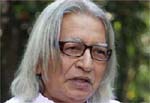Belal Mohammad’s Death
Cultural arena mourns
 Cultural arena mourns the death of poet Belal Mohammad, an organiser of Swadhin Bangla Betar Kendra, who died at the age of 77 at the Apollo Hospital in the capital early hours on Tuesday.
Cultural arena mourns the death of poet Belal Mohammad, an organiser of Swadhin Bangla Betar Kendra, who died at the age of 77 at the Apollo Hospital in the capital early hours on Tuesday.
He had been suffering from old age complications.
A founder of Swadhin Bangla Betar Kendra, Belal Mohammad was appointed the deputy director of the radio station by the government in exile. He retired from Bangladesh Betar in 1994.
Belal Mohammad authored around 25 books on poetry, history and memoirs. His book on Swadhin Bangla Betar Kendra is considered as the most authentic document on the radio station, which played an important role during the war of independence.
Kabita Noy, Parjay Nei, Akal Apatra, Nirbachito Kabita, Anyakule Palimati, Birsreshthader Katha and others are few of the remarkable books he had authored. He also wrote his autobiography titled Kato Ghorey Thai. For his contribution during the war of independence as an organiser, Belal Mohammad was honoured with the Independence Day Award, the highest state honour for a civilian, in 2010.
He was also a recipient of Bangla Academy Award in 2011. Belal Mohammad was born on February 20, 1936 in Sandwip. He joined the Chittagong Centre of the then Pakistan Radio in 1964 as a script writer.
He played the lead role for the arrangement of the declaration of independence of the country by late Major Ziaur Rahman on behalf of founder president Sheikh Mujibur Rahman from Kalurghat Transmission Centre in Chittagong.
Belal and others subsequently fled to India and started the activities of the Swadhin Bangla Betar Kendra.
‘I’m always grateful to him as he took me to the Swadhin Bangla Betar Kendra. He was always a vocal against communalism and militancy. We shared a very good relation. He was an introvert but an uncompromising character,’ eminent poet Asad Chowdhury told New Age.
‘He had a remarkable contribution in preserving the documents of the Swadhin Bangla Betar Kendra after Bangabandhu’s assassination in 1975,’ Chowdhury added.
Another poet Nirmalendu Goon said, ‘He is a part of our history and witness of many activities during the war and after. He used to write many poems to boost the freedom fighters during the war. I was also involved with the programme planning for the radio station. Moreover, he used to encourage us to write poems.’
‘As a poet, he had not achieved much success but he was a poet by soul and had always been encouraging. He introduced the term “Shabda Sainik” to give recognition to the artistes of Swadhin Bangla Betar Kendra as freedom fighters,’ poet Goon added.
Another Swadhin Bangla Betra Kendra artiste Fakir Alamgir said, ‘He played the lead role from the “defect” of the Kalurghat Station in Chittagong to the last day of Swadhin Bangla Betar Kendra. He had such a strong bond with the artistes of the radio station that he continued his activities with the members of Swadhin Bangla Shilpi Samity even in his last days of life.’
Trustee and member secretary of Liberation War Museum Mafidul Haque evaluates Belal Mohammad as an important part of the history of the independence of the country. ‘He will survive through his works,’ Mafidul Haque said.
‘Through his writings, Belal Mohammad conveyed the history of the war to the next generation for which we honoured him with the Bangla Academy Award,’ Shamsuzzaman Khan, director general of Bangla Academy stated in a written condolence message.
-With New Age input




















